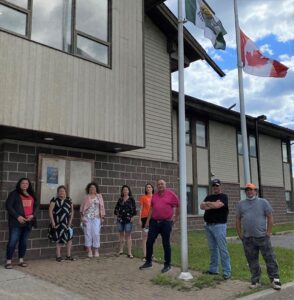Fort William First Nation leadership demands investigation into known and suspected burial sites at local former residential school

By Rick Garrick
FORT WILLIAM — Fort William is calling for the federal government to identify and return the remains of children from known and suspected burial sites such as the former St. Joseph’s Indian residential school in Thunder Bay.
“We are demanding that all known and suspected burial sites within Fort William treaty territory be investigated for the remains of children,” says Fort William Chief Peter Collins during a June 18 press conference, which is available online. “We know they experimented with our kids [at the former Lakehead Psychiatric Hospital in Thunder Bay] — we want that site sounded out, and the former site of Fort William First Nation where the church was, where our community burial grounds was, and all of our families were exhumed from that site.”
Chief Collins says the community does not know if all of the remains of family members were exhumed from the former burial site, which was located in the former location of the community on the south bank of the Kaministiquia River that was taken for a railway terminus in 1905.
“We don’t know if they got them all so we’re asking for this government to make sure they do sounding in that area to make sure each and every one of those family members [was] placed in their rightful place in Fort William,” Chief Collins says. “Further, Fort William First Nation calls on all the churches, the governments, both provincial and federal crown, to cooperate by releasing all full or partial records when requested to do so and to not put a limit on funding that is made available to First Nations in this country to make sure every child is found, identified and returned home to their rightful place.”
Chief Collins also called for the federal government to reinstate the Aboriginal Healing Foundation and to provide services, supports and additional funds for expanded programming for the survivors and their families for healing from the effects and intergenerational trauma of residential and day schools.
“We join the Indian Residential School Survivors, their families and the Truth and Reconciliation Commission (TRC) report to ensure the ongoing future protection and preservation of all records collected through the TRC process,” Chief Collins says. “Under no circumstances can these records be destroyed. True reconciliation and the spirit of [reciprocity] is giving all citizens in the country an opportunity to teach future generations, and that is the important part, teaching future generations about the traumas of Indian Residential Schools and how it impacted our community.”
Chief Collins says the residential school effects still impact Fort William today.
“We see it on an ongoing basis here in our community, how it’s had an impact on our families, how it’s had an impact on our community,” he says. “So we’re demanding that this government do the rightful thing and look at these particular sites that we have identified here today. We’ve been directed by our Elders … to make sure that every site, every location within our treaty territory has been examined to its fullest extent.”
Chief Collins says one of the challenges is that Fort William does not know how many children’s remains may be located on the sites or which records exist.
“That’s a challenging part for us,” Chief Collins says. “That information is important to us so we can do the proper work and the proper timeframes are put in place so the exploration of these properties can be done in a timely manner.”
The press conference is posted on the Fort William Facebook page.

